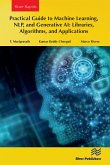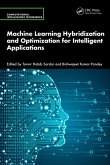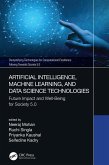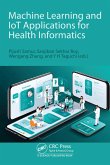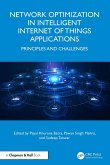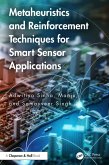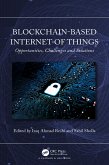T. Mariprasath, Kumar Reddy Cheepati, Marco Rivera
Practical Guide to Machine Learning, NLP, and Generative AI: Libraries, Algorithms, and Applications (eBook, ePUB)
59,95 €
59,95 €
inkl. MwSt.
Sofort per Download lieferbar

30 °P sammeln
59,95 €
Als Download kaufen

59,95 €
inkl. MwSt.
Sofort per Download lieferbar

30 °P sammeln
Jetzt verschenken
Alle Infos zum eBook verschenken
59,95 €
inkl. MwSt.
Sofort per Download lieferbar
Alle Infos zum eBook verschenken

30 °P sammeln
T. Mariprasath, Kumar Reddy Cheepati, Marco Rivera
Practical Guide to Machine Learning, NLP, and Generative AI: Libraries, Algorithms, and Applications (eBook, ePUB)
- Format: ePub
- Merkliste
- Auf die Merkliste
- Bewerten Bewerten
- Teilen
- Produkt teilen
- Produkterinnerung
- Produkterinnerung

Bitte loggen Sie sich zunächst in Ihr Kundenkonto ein oder registrieren Sie sich bei
bücher.de, um das eBook-Abo tolino select nutzen zu können.
Hier können Sie sich einloggen
Hier können Sie sich einloggen
Sie sind bereits eingeloggt. Klicken Sie auf 2. tolino select Abo, um fortzufahren.

Bitte loggen Sie sich zunächst in Ihr Kundenkonto ein oder registrieren Sie sich bei bücher.de, um das eBook-Abo tolino select nutzen zu können.
This is an essential resource for beginners and experienced practitioners in machine learning. This comprehensive guide covers a broad spectrum of machine learning topics, starting with an in-depth exploration of popular machine learning libraries.
- Geräte: eReader
- mit Kopierschutz
- eBook Hilfe
- Größe: 4.24MB
Andere Kunden interessierten sich auch für
![Practical Guide to Machine Learning, NLP, and Generative AI: Libraries, Algorithms, and Applications (eBook, PDF) Practical Guide to Machine Learning, NLP, and Generative AI: Libraries, Algorithms, and Applications (eBook, PDF)]() T. MariprasathPractical Guide to Machine Learning, NLP, and Generative AI: Libraries, Algorithms, and Applications (eBook, PDF)59,95 €
T. MariprasathPractical Guide to Machine Learning, NLP, and Generative AI: Libraries, Algorithms, and Applications (eBook, PDF)59,95 €![Machine Learning Hybridization and Optimization for Intelligent Applications (eBook, ePUB) Machine Learning Hybridization and Optimization for Intelligent Applications (eBook, ePUB)]() Machine Learning Hybridization and Optimization for Intelligent Applications (eBook, ePUB)52,95 €
Machine Learning Hybridization and Optimization for Intelligent Applications (eBook, ePUB)52,95 €![Artificial Intelligence, Machine Learning, and Data Science Technologies (eBook, ePUB) Artificial Intelligence, Machine Learning, and Data Science Technologies (eBook, ePUB)]() Artificial Intelligence, Machine Learning, and Data Science Technologies (eBook, ePUB)48,95 €
Artificial Intelligence, Machine Learning, and Data Science Technologies (eBook, ePUB)48,95 €![Machine Learning and IoT Applications for Health Informatics (eBook, ePUB) Machine Learning and IoT Applications for Health Informatics (eBook, ePUB)]() Machine Learning and IoT Applications for Health Informatics (eBook, ePUB)52,95 €
Machine Learning and IoT Applications for Health Informatics (eBook, ePUB)52,95 €![Network Optimization in Intelligent Internet of Things Applications (eBook, ePUB) Network Optimization in Intelligent Internet of Things Applications (eBook, ePUB)]() Network Optimization in Intelligent Internet of Things Applications (eBook, ePUB)52,95 €
Network Optimization in Intelligent Internet of Things Applications (eBook, ePUB)52,95 €![Metaheuristics and Reinforcement Techniques for Smart Sensor Applications (eBook, ePUB) Metaheuristics and Reinforcement Techniques for Smart Sensor Applications (eBook, ePUB)]() Adwitiya SinhaMetaheuristics and Reinforcement Techniques for Smart Sensor Applications (eBook, ePUB)52,95 €
Adwitiya SinhaMetaheuristics and Reinforcement Techniques for Smart Sensor Applications (eBook, ePUB)52,95 €![Blockchain-based Internet of Things (eBook, ePUB) Blockchain-based Internet of Things (eBook, ePUB)]() Blockchain-based Internet of Things (eBook, ePUB)52,95 €
Blockchain-based Internet of Things (eBook, ePUB)52,95 €-
-
-
This is an essential resource for beginners and experienced practitioners in machine learning. This comprehensive guide covers a broad spectrum of machine learning topics, starting with an in-depth exploration of popular machine learning libraries.
Dieser Download kann aus rechtlichen Gründen nur mit Rechnungsadresse in A, B, BG, CY, CZ, D, DK, EW, E, FIN, F, GR, HR, H, IRL, I, LT, L, LR, M, NL, PL, P, R, S, SLO, SK ausgeliefert werden.
Produktdetails
- Produktdetails
- Verlag: Taylor & Francis
- Erscheinungstermin: 23. Dezember 2024
- Englisch
- ISBN-13: 9781040260050
- Artikelnr.: 72522313
- Verlag: Taylor & Francis
- Erscheinungstermin: 23. Dezember 2024
- Englisch
- ISBN-13: 9781040260050
- Artikelnr.: 72522313
- Herstellerkennzeichnung Die Herstellerinformationen sind derzeit nicht verfügbar.
Dr. T. Mariprasath received his Ph.D. degree from the Rural Energy Centre at The Gandhigram Rural Institute (Deemed to be University) in January 2017, fully funded by the Ministry of Human Resource Development-Government of India. Since June 2018, he has been working as an Associate Professor in the Department of EEE at K.S.R.M. College of Engineering (Autonomous), Andhra Pradesh, India. He has published in 10 articles in journals indexed in the Science Citation Index and 15 articles indexed in Scopus. Additionally, he has authored three books and six book chapters. Moreover, he holds an Indian patent and has been granted an Australian innovation patent. He received Rs. 6 lakhs from the Ministry of Micro, Small, and Medium Enterprises to develop a self-powered GPS tracker. His research interests include green materials, electric vehicles, solar PV, and machine learning.
Dr. Kumar Reddy Cheepati received his B.Eng. degree in electrical and electronics engineering from the St. Joseph's College of Engineering, Chennai, India in 2009, his M.Tech. degree in maintenance engineering from SJCE, Mysore, India (now JSS Technical University) in 2011, and his Ph.D. degree from JNTUK, Kakinada, India in 2021. He is currently working as an Associate Professor with the Department of Electrical and Electronics Engineering, KSRM College of Engineering, Kadapa, Andhra Pradesh, India. He has 12 years of academic experience. He has published research papers in various international journals of high repute, including Scopus, SCI, and ESCI indexed journals. He is an active reviewer of the Electrical Power System Research (EPSR) journal, Journal of Circuits, Systems, and Computers (JCSC), Journal of Engineering Research (JER), and Circuit World journal.
Dr. Marco E. Rivera (Senior Member, IEEE) received an electronic civil engineering degree and M.Sc. degree in engineering, with specialization in electrical engineering, from the Universidad de Concepción, Concepción, Chile, and a Ph.D. degree in electronic engineering from the Universidad Técnica Federico Santa María, Valparaíso, Chile, in 2012. He has been a visiting professor at several international universities. He has directed and participated in several projects financed by the National Fund for Scientific and Technological development (Fondo Nacional de Desarrollo Científico y Tecnológico, FONDECYT), the Chilean National Agency for Research and Development (Agencia Nacional de Investigación y Desarrollo, ANID), and the Paraguayan Program for the Development of Science and Technology (Proyecto Paraguayo para el Desarrollo de la Ciencia y Tecnología, PROCIENCIA), among others. He has been the responsible researcher of basal financed projects whose objective is to enhance, through substantial and long-term financing, Chile's economic development through excellence and applied research. He is the Director of the Laboratory of Energy Conversion and Power Electronics (Laboratorio de Conversión de Energías y Electrónica de Potencia, LCEEP), Universidad de Talca, Talca, Chile. He was a Full Professor with the Department of Electrical Engineering, Universidad de Talca. Since April 2023, he has been a Professor with the Power Electronics and Machine Centre, University of Nottingham, Nottingham¿ UK. He has authored or coauthored more than 500 academic publications in leading international conferences and journals. His main research areas are matrix converters, predictive and digital controls for high-power drives, four-leg converters, development of high-performance control platforms based on field-programmable gate arrays, renewable energies, advanced control of power converters, design, assembly and start-up of power converters, among others.
Dr. Kumar Reddy Cheepati received his B.Eng. degree in electrical and electronics engineering from the St. Joseph's College of Engineering, Chennai, India in 2009, his M.Tech. degree in maintenance engineering from SJCE, Mysore, India (now JSS Technical University) in 2011, and his Ph.D. degree from JNTUK, Kakinada, India in 2021. He is currently working as an Associate Professor with the Department of Electrical and Electronics Engineering, KSRM College of Engineering, Kadapa, Andhra Pradesh, India. He has 12 years of academic experience. He has published research papers in various international journals of high repute, including Scopus, SCI, and ESCI indexed journals. He is an active reviewer of the Electrical Power System Research (EPSR) journal, Journal of Circuits, Systems, and Computers (JCSC), Journal of Engineering Research (JER), and Circuit World journal.
Dr. Marco E. Rivera (Senior Member, IEEE) received an electronic civil engineering degree and M.Sc. degree in engineering, with specialization in electrical engineering, from the Universidad de Concepción, Concepción, Chile, and a Ph.D. degree in electronic engineering from the Universidad Técnica Federico Santa María, Valparaíso, Chile, in 2012. He has been a visiting professor at several international universities. He has directed and participated in several projects financed by the National Fund for Scientific and Technological development (Fondo Nacional de Desarrollo Científico y Tecnológico, FONDECYT), the Chilean National Agency for Research and Development (Agencia Nacional de Investigación y Desarrollo, ANID), and the Paraguayan Program for the Development of Science and Technology (Proyecto Paraguayo para el Desarrollo de la Ciencia y Tecnología, PROCIENCIA), among others. He has been the responsible researcher of basal financed projects whose objective is to enhance, through substantial and long-term financing, Chile's economic development through excellence and applied research. He is the Director of the Laboratory of Energy Conversion and Power Electronics (Laboratorio de Conversión de Energías y Electrónica de Potencia, LCEEP), Universidad de Talca, Talca, Chile. He was a Full Professor with the Department of Electrical Engineering, Universidad de Talca. Since April 2023, he has been a Professor with the Power Electronics and Machine Centre, University of Nottingham, Nottingham¿ UK. He has authored or coauthored more than 500 academic publications in leading international conferences and journals. His main research areas are matrix converters, predictive and digital controls for high-power drives, four-leg converters, development of high-performance control platforms based on field-programmable gate arrays, renewable energies, advanced control of power converters, design, assembly and start-up of power converters, among others.

